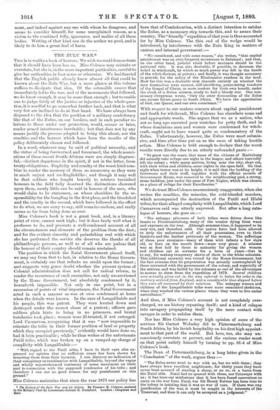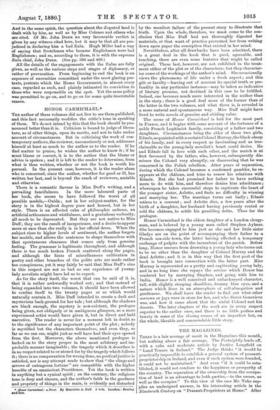THE ZULU WAR.* Tins is iu reality a book of
horrors. We wish we could demonstrate that it should have been less so. Miss Colenso may mistake or overstate, but she is, in the more important particulars, careful to give her authorities in foot-notes or otherwise. We had fancied that the English public already knew almost all that could be known about the Zulu War, but a mere glance at this volume suffices to dissipate that idea, Of the ostensible causes that immediately led to the war, and of the movements that followed, we do know enough, it may be more than enough ; but to enable one to judge fairly of the justice or injustice of the whole ques- tion, it is needful to go somewhat further back, and that is what very few are inclined to do at first hand. We have always been disposed to the idea that the position of a military confederacy like that of the Zulus, on our borders, and in such peculiar re- lations to those under our protection, would, sooner or later, render armed interference inevitable ; but that does not by any means justify the process adopted to bring this about, nor the cruelties and the horrors which have been the results of the policy deliberately chosen and followed.
In a word, whatever may be said of political necessity, and the virtue of being forewarned and forearmed, the whole associ- ations of these recent South-African wars are simply disgrace- ful,—distinct departures in the spirit, if not in the letter, from treaty-obligations. Duplicity and cruelty of the worst kind com- bine to render the memory of them as unsavoury as they were in much unjust and un-Englishlike ; and though it may well be that soldiers who fought bravely to retrieve tarnished honours in the field fully deserved the distinctions showered upon them, surely little can be said in honour of the men, who would claim to be statesmen, on whose shoulders lie the re- sponsibility for the bungling in the first place, and the bloodshed and the cruelty in the second, which have followed in the effort to do what, we are sorry to say, still remains undone, and really seems as far from being done as ever.
Miss Colenso's book is not a great book, and, in a literary point of view, cannot rank high ; but it does fairly well what it professes to do, and presents a well-condensed account of all the circumstances and elements of the problem from the first; and for the evident sincerity and painstaking zeal with which she has performed the service she deserves the thanks of all philanthropic persons, as well as of all who are jealous that the honour of their country should remain unstained.
The position in which the Natal Government placed itself, we may say from first to last, in relation to the Home Govern- ment, is certainly one that reflects no credit upon the former ; and suggests very grave doubt whether the present system of Colonial administration does not call for radical reform, to render the recurrence of such enormities, not only unsanctioned by the Home Government, but absolutely condemned by it, hencefcrth inipossible. Not only in one point, but in a succession of points of vital importance, the Natal Government acted in such a manner as was at once condemned at home when the details were known. In the case of Langalibalele and his people, this was patent. They were hunted down and destroyed under the merest sham of a pretext ; officers gave soldiers plain hints to bring in no prisoners, and brutal butcheries took place ; women were ill-treated, if not outraged. Lord Carnarvon, recognising that it was " now impossible to reinstate the tribe in their former position of land or property which they occupied previously," evidently would have done so, had it been practicable ; while he thus writes of the unfortunate Putili tribe, which was broken up on a vamped-up charge of complicity with Langalibalele :-
" With regard to the Putili tribe, I have in their case also ex- pressed my opinion that no sufficient cause has been shown for removing them from their location. I can discover no indication of their conspiracy or combination with Langalibalele, beyond the vague and wholly uncorroborated testimony of some movement on their part in connection with the supposed tendencies of his tribe ; and therefore I can see no good reason for any punishment on this ground."
Miss Colenso maintains that since the year 1873 our policy has * The History of the Zulu War and its Origin. By Frances B. Colenso, assisted In the liditary Part by Lieutenant-Colonel B. Bamford. London: Chapman and Ball.
been that of Confederation, with a distinct intention to subdue the Zulus, as a necessary step towards this, and to annex their country. The "friendly" expedition of that year is thus accounted for by Miss Colenso. The thin end of the wedge would be introduced, by interference with the Zulu. King in matters of custom and internal government :—
" We considered, and with some reason," she writes, "that capital punishment was an over-frequent occurrence in Zululand ; and that, on the other hand, judicial trials before sentence should be the universal rale. It was also desirable, if possible, to decrease the belief in witchcraft, by which so much power was left in the hands of the witch-doctors, or priests ; and finally, it was thought necessary to provide for the safety of the Missionaries resident in the land. How far this was a desirable step depends entirely on whether the men themselves were earnest, self-sacrificing, peace-loving teachers of the Gospel of Christ, or mere traders for their own benefit, under the cloak of a divine mission, ready to hail a bloody war. One mis- sionary clergyman wrote, Only the utter destruction of the Zulus can secure future peace to South Africa. We have the approbation of God, our Queen, and our own conscience.' " With respect to our zealous concern about capital punishment and death for witchcraft, Miss Colenso has elsewhere some sad and appropriate words. She argues that we as a nation, who not so long ago executed poor wretches for petty theft, and in whose dominions men and women were condemned for witch- craft, ought not to have waxed quite so condemnatory of the Zulus. Unfortunately, however, the Zulus were most submis- sive, and time after time put on us the onus of taking hostile action. Miss Colenso is bold enough to declare that the worst
results were directly due to an utterly unfounded panic :-
" So great was the scare, that some of the citizens of Maritzburg did actually take refuge one night in the laager, and others hurriedly left the colony ; while many natives, living near the city, slept out, with their wives and children, some nights in the open field. On that night when terror was at its height, it is said that the bedding of the Governors and their staff, together with the official records of Government House, was removed to the neighbouring gaol, a strong, stone building, just under the guns of Fort Napier, which was chosen as a place of refuge for their Excellencies."
We do trust Miss Colenso unconsciously exaggerates, when she recites the cruelties, the miseries, the cold-blooded murders, which accompanied the destruction of the Putili and Hlubi tribes, for their alleged complicity with Langalibalele, which Lord Carnarvon said was utterly unproved. But after a long cata- logue of horrors, she goes on :—
" The unhappy prisoners of both tribes were driven down like beasts to Pietermaritzburg, many of the weaker dying from want and exposure on the way. Although summer-time, it happened to be very wet, and therefore cold. Our native force had been allowed to strip the unfortunates of all their possessions, even to their blankets and the leather petticoats of the women. The sufferings of these poor creatures—many of them with infants a few days old, or born on the march down—were very great. A scheme was at first laid by those in authority for giving the women and children out as servants for a term of years—that is to say, for making temporary slaves of them to the white colonists. This additional enormity was vetoed by the Home Government, bat the fact remains that its perpetration was actually contemplated by those entrusted with the government of the colony, and especially of the natives, and was hailed by the colonists as one of the advantages to accrue to them from the expedition of 1873. Several children: were actually given out in the way referred to before the order to the contrary arrived from England, and a considerable time elapsed before they were all recovered by their relatives. The unhappy women and children of the Langalibalele tribe were mere emaciated skeletons, when they reached the various places where they were to live under surveillance."
And thus, if Miss Colenso's account is not completely over- charged, we see history repeating itself ; and a kind of relapse into savagery propagating itself by the mere contact with savages in order to subdue them.
Nor has Miss Colenso a very high opinion of some of the services Sir Garnet Wolseley did to Pietermaritzburg and South Africa, by his lavish hospitality on his first high appoint- ment to that part of the world. But here, too, she may un- consciously overstate or pervert, and the curious reader must on that point satisfy himself by turning to pp. 81-4 of Miss Colenso's book.
The Dean of Pietermaritzburg, in a long letter given in the " Conclusion" of the work, argues thus r-
" The Zulus never went to war with us, but we with them; they have always been excellent neighbours; for thirty years they have never been accused of stealing a sheep, or an ox, or a horse from the Natal side. Natal had no quarrel with them, nor Cetewayo with us; it has been our misfortune that it has been found convenient to carry on the war from Natal, but Sir Henry Bulwer has been true to the colony in insisting that it was no war of ours. If there was any justification of the war, it must be sought in the interests of the Transvaal, and then it can only be accepted as a judgment." -
And in the same spirit, the question about the disputed land is dealt with by him, as well as by Miss Coleus() and others who are cited. Of Mr. John Dunn no very favourable verdict is given by any witness cited here, but it may be that all are pre- judiced in declaring him a bad Zulu. Hugh Miller had a way of saying that Scotchmen who became Englishmen were bad Englishmen; and so, according to them, it is with the supreme Zulu chief, John Dunn. (See pp. 386 and 488.) All the details of the engagements with the Zulus are fully given, as well as the various steps and stages of diplomacy, or rather of provocation. From beginning to end the book is an exposure of enormities committed under the most glaring pre- texts, pretexts which the Home Government, in almost every case, regarded as such, and plainly intimated its conviction to those who were responsible on the spot. Yet the same policy was permitted to go on, and to go on for some quite inscrutable reason.



































 Previous page
Previous page